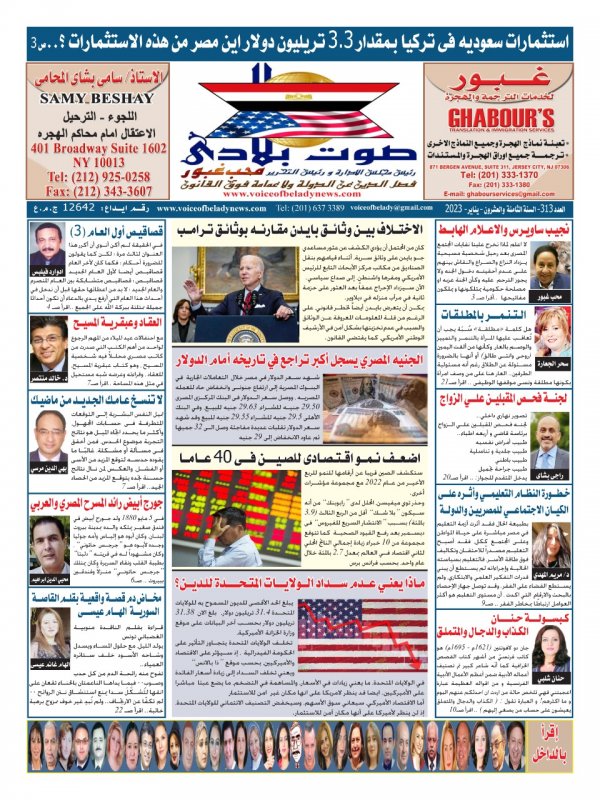Huwaida Awad Ahmed wrote
Since the end of the Cold War, the attention of the United States has focused on the successive events in the Middle East, given the growing economic and strategic importance of this region.
This interest focuses specifically on the apparent emergence of the Islamic movement, not only at the level of the Middle East region, but also across Southeast Asia, Central Asia, and North Africa.
There is a variety of evidence that the United States applied the policy of containment and the logic of dominoes to the course of political events in the Islamic world, starting with the Middle East region, passing through North Africa and Central Asia, and ending with Indonesia. But it is not clear who are the opponents that these theories should face.
In certain contexts, it appears that there are some concerns about political Islam as a growing political and intellectual force in these regions, for example. The media is quoting an old American diplomat saying that if the Afghans and Muslim extremists could control Tajikistan, this means that they have reached the red square in Tajikistan. The heart of the Russian capital, Moscow, and that American interests in Tajikistan are mainly linked to helping Russia prevent the fall of the first dominoes of Tajikistan. The dangers lurking in the last of these stones, which is Kazakhstan, which is rich in oil, gas reserves and nuclear weapons, is very important.
In other cases, the focus of US foreign policy is not on Islam as an ideology, but on countries that are seen as exporting this ideology, such as Iran and Sudan.
Since the spring of 1993, the Clinton administration began pursuing a policy of dual containment with the aim of building alliances with its friends within the country in order to limit the power of its radical and extremist enemies. Specifically, Iran and Iraq. This policy involves Baghdad's compliance with United Nations resolutions on imposing economic sanctions, in addition to preventing its rearmament.
As for Iran, American interests focus on the Iranian desire to support and export extremism.
Especially the Islamic extremism.
But ..
When you refer to the official records, we find that the position of American decision makers is clearly and consistently summarized in that Islam in itself is not considered the next opponent to confront the United States or that it poses any threat to it.
In addition, in their public statements, senior US officials or policy makers do not address issues of political Islam at all, but focus most of their efforts on discussing issues related to the Arab-Israeli conflict, the continuation of international sanctions against Iraq, and Gulf cooperation.
The hard-line American position on containing violence may be consistent and principled, but its stance towards democracy remains less clear for sure. The United States has often supported the program of transition to democracy and considered this process of greater importance to its interests in the wake of the end of the Cold War, but it does not appear from practical evidence to enhance the credibility of the American government in this regard,
Especially if we look at the reactions of the United States towards the political events in Algeria after the sweep of the Islamic Salvation Front in the legislative elections in 1992.
In that year, US National Security Adviser Anthony Lake acknowledged this glaring contradiction in his country's position, saying that American interests sometimes require us to support and befriend even to defend undemocratic governments for reasons related to mutual benefits between us.
It is certain that such a negligent attitude towards democracy is not a new matter in US policy, particularly in the Middle East region. The United States must woo and support those movements that expose images of oppression by their governments and call for political pluralism instead of continuing to extend a helping hand to these movements. governments.
Why does the United States not help many countries in the East in their movement towards democracy, which the American administration considers a priority and its principles?
The domino theory shows that the most important difficulties facing the perceptions of American policy makers about the role of Islam in the Middle East through the domino theory is its rise to the level of a metaphorical image, and Jerome Slater put forward the perception that all revolutions constitute external threats to the United States
And the existence of strong links between all revolutions within one country and the possibility of their occurrence in other countries
As a result of these close ties, the United States must move quickly.
And that in the event of the fall of one of the countries, this will lead to the fall of the rest of the countries in the region, and perhaps even further than that.
The domino theory is that the targeted countries are weak from within, small in size, geographically connected, and deprived of strong allies.
And that the first falling domino piece is similar in its characteristics to the countries targeted later.
For the political dominoes to be a large state whose fall means a significant increase in the expansionist state’s resources, or raises questions about the will of the power parties in light of the de facto situation in fighting for their interests..and for military technology to facilitate the attack process.
In most cases, the Iranian revolution of 1979 is seen as the first indicator of the power of Islam, despite the emergence of a new Islamic political tide in Pakistan with the beginning of the seventies, and during the eighties, the United States began to link political Islam to these organizations and Islam, and Washington has since looked at Iran and Sudan. In later eras, they took advantage of the state of frustrating instability in their neighbors and carried out strong support for the opposition there with various financial, military and ideological facilities.
And while it seems worrisome to the West that many of the world’s population share the Islamic bond of bondage, it can never be said that such an Islam poses any common political and ideological danger to anyone, even in the case of a group of Islamic countries joining a common economic approach, for example, or establishing an ideological base. Deep, it is not clear that these phenomena constitute any form of organized threat against the West or against the international community in general.
The real dangers and threats will remain in the individual case represented by governments that do not respect human rights and citizenship on their soil or in other countries.
Perhaps this type of threat is not unique to the Islamic dimension, as it is a reality of life at the international level, regardless of faith and the reward.
The biggest real danger hanging over the region still lies in the instability and alienation of citizens from their governments and their sense of distance from them. The regimes that are popularly elected and enjoy the support of the masses on their side in addition to the global support represent the greatest hope in restoring stability in the region without distinguishing between their ideological and intellectual foundations.
The domino theory has the potential to make inaccurate assumptions about the pictures US policymakers see and not justify worst-case assumptions.
These logical connections will inevitably lead to inappropriate and unbalanced policy in the region, and while policy makers must exercise reasonable caution, especially when the worst-case scenarios are present, this will inevitably lead to self-satisfactory predictions only.
As the wrong policy may in turn lead to the realization of the dangers of the domino theory.
The domino theory does not provide any additional explanation for the issue of political Islam than what it presented regarding the communist threat.
Politics has never been so elegantly and clearly explained as the domino theory tries to convince us of. Certainly, its beliefs and absolute determinism raise serious questions about its validity.
The determinism of the theory dictates that the actors concerned have no choice in the matter.
As its results are inevitable, and this type of thinking reduces to a large extent the human ability to learn and adapt to his environmental surroundings.
We have seen throughout the ages until now that the domino theory has not been realized as its adherents wanted it. When political Islam ruled Egypt, its people rejected it. When Libya fell, its neighbors did not. When Iraq fell, the Gulf states did not fall, even if attempts were made in Sudan, this is not an indication of the fall of its neighbors.
And when Ukraine fell, Russia did not fall, and so we see over the course of time that this theory must coincide and unite with it a general atmosphere for the fall of states like a domino stone.




 رئيس التحرير يكتب : من التراب وإلى التراب يعود .. تحويل جثث الموتى إلى سماد عضوى
رئيس التحرير يكتب : من التراب وإلى التراب يعود .. تحويل جثث الموتى إلى سماد عضوى
 رئيس التحرير يكتب : لماذا تصر الحكومة على استمرار شريف أبو النجا رئيسا لمستشفى 57357 رغم الشواهد العديدة على فساده
رئيس التحرير يكتب : لماذا تصر الحكومة على استمرار شريف أبو النجا رئيسا لمستشفى 57357 رغم الشواهد العديدة على فساده اقرأ في العدد الجديد ( عدد يناير ٢٠٢٣ ) من جريدة صوت بلادي
اقرأ في العدد الجديد ( عدد يناير ٢٠٢٣ ) من جريدة صوت بلادي









